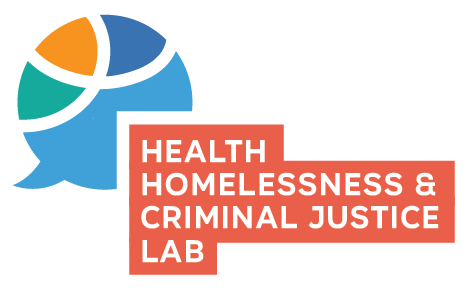
Project Highlights
Diabetes Homelessness Medication Support (DHomes) study
In the DHomes study, Dr. Vickery, HHCJ lab staff, and a multi-stakeholder research team focuses on the health of people experiencing Type 2 Diabetes and homelessness. This is a three part project. First, we conducted focus groups and interviews with service providers and people experiencing homeless to find out what type of program would best help patients manage their diabetes. Second, we used that data to design a Diabetes Wellness Coaching program. Our goal is to support people to improve their overall wellness and diabetes management (hemoglobin A1c) through improved medication adherence and better use of community resources. Diabetes Wellness Coaches work with participants for a total of 10 weeks to help them set medication and health specific goals to improve their health. Third, we will pilot test the program, in a randomized pilot clinical trial.
The project is funded by the National Institute of Diabetes and Digestive and Kidney Diseases.
Minnesota Homelessness Mortality Report, 2017 - 2021
The Minnesota Homeless Mortality Report project was led by Dr. Vickery. This project was a collaboration between the MDH Public Health and Homelessness Center of Excellence and the HHCJ lab. The role of our team was to support the creation of a first-ever statewide systematic analysis of mortality among people experiencing homelessness who die in Minnesota. Our team merged Minnesota state death data, Minnesota Homelessness Management Information System (HMIS) data, and Minnesota population data (from the Census) to compare sociodemographic differences and causes of death among people experiencing homelessness and the general Minnesota Population. The report was published on January 26, 2023. The data reveal death rates are three times higher among people who experience homelessness compared to the general Minnesota population.
Jail based use of smoking cessation treatment (JUST):
In this pilot clinical trial, Dr. Winkelman and Dr. Andrew Busch (Behavioral Health Disparities Research Group, Hennepin Healthcare Research Institute) conducted the first ever smoking cessation trial in a US county jail setting. In this study, participants assigned to the intervention group received counseling while they were in jail and counseling plus nicotine lozenges after they were released. This is the standard treatment for people who use tobacco but incarcerated individuals rarely have access to this type of care. We found that people were enthusiastic about participating and that this type of intervention may help people reduce their smoking when they leave jail.
This study was funded by Clearway Minnesota and published in JAMA Network Open.
Transitions Clinic Network: Post Incarceration Addiction Treatment, Healthcare, and Social Support (TCN-PATHS)
HHCJ is one of six sites participating in a nationwide study led by Yale University to prevent opioid overdose among people recently released from jail or prison. This 5-year study aims to measure the relative effectiveness of providing care at a Transitions Clinic versus a standard primary care clinic for people recently released from jail. Transitions Clinics use an innovative approach to linking people to care after release, which centers around working with a Community Health Worker who has lived experience of incarceration and training clinic staff to meet the unique needs of the justice-involved population. To learn more about the Transitions Clinic Network, visit https://transitionsclinic.org/.
This project is funded by the National Institute on Drug Abuse’s Justice Community Opioid Innovation Network. Additional information about this study is available at https://www.sciencedirect.com/science/article/abs/pii/S0740547221000416.
Minnesota Electronic Health Record: Homelessness and Incarceration COVID-19 Vaccination project
The Homelessness and Incarceration COVID-19 Vaccination project is led by Drs. Vickery and Winkelman. In this partnership between the HHCJ Lab, the Minnesota Department of Health, the Institute for Community Alliances (which manages Minnesota’s Homelessness Management Information system [HMIS]), and the Minnesota Electronic Health Record Consortium, our team is leading efforts to track COVID-19 vaccinations among Minnesotans who have recently been homeless or incarcerated. By using hashing algorithms to match data extracts from Minnesota’s HMIS and the Minnesota Department of Corrections with electronic immunization records from the Minnesota Immunization Information Connection system, we are able to report on vaccine equity metrics among people with recent homelessness or incarceration and inform outreach efforts to these populations.
This project is funded by the Minnesota Department of Health.
Stories for Change (S4C)
Led by the Mayo Clinic, Drs. Vickery, Ford and Mr. Kavistan conduct study activities at Hennepin Healthcare. S4C is a randomized clinical trial testing the efficacy of viewing a digital storytelling intervention. The digital narratives were created in partnership with the Rochester Community Health Partnership using a community engaged research approach. In the videos, Hispanic Spanish speaking adults with type 2 diabetes tell stories about how they learned to manage their diabetes. The purpose of the study is to understand if the digital stories, created by other Hispanic adults about how they take care of themselves and manage their diabetes, can make a positive behavior change for patients in the study. Learn More
This study was funded by the National Institute of Diabetes and Digestive and Kidney Diseases.
Minnesota Electronic Health Record Consortium: Trends in Substance Use Related Hospital Admissions and Emergency Department Visits in Hennepin County, MN
The Hennepin County Substance Use Disorder (SUD) project is a partnership between the HHCJ lab, the MN Electronic Health Record Consortium, and Hennepin County. The primary aim of the project is to assemble summary data from Consortium partners who provide care in Hennepin County to generate a county-wide aggregate dataset on current trends in substance-related health care patterns. The monthly reports provide timely information and are used by Hennepin County to guide opioid use/overdose prevention and response program prioritization and implementation
The project is funded by Hennepin County, MN.
DHomes and zAmya Life Heist: Stealing Hope while Surviving Diabetes and Homelessness
Our Diabetes and Homelessness (DHomes) research study project team had the opportunity to collaborate with the zAmya Theater company. The information generated by our study participants became incorporated into a theatrical production called Life Heist: Stealing Hope while Surviving Diabetes and Homelessness.
Through Life Heist, we were able to be a part of the platform that made space for the voices of a community of people who are traditionally voiceless. This collective effort has been one step in changing the narrative on the typical relationship between community and research.
